I feel like Haven is one of those shows that I’m the only person who watched it. But I still find it fairly interesting and it definitely has some valuable storytelling lessons to glean. I’ve tried to limit spoilers so you can access the writing lessons without ruining the show.
I binged two and a half seasons of Haven (like 30 some-odd episodes) in a week. Even though I’d seen most of the episodes before it still drew me into… the mythology and the characters but most of all to the stunning things the show did RIGHT.
To be fair, they also did a few things wrong with contrived conflict in a few episodes and all. But the things they did right were so refreshing and amplified the characters so well, I couldn’t stop watching.
The Power of Choice
Haven is a prime example of writers who understand the power of making choices. It creates dynamic characters and authentic, deep conflict.
Conflict between the characters.
Conflict within the characters.
Their choices drive the plot (even at times off the rails a little).
And not only do the characters make choices, they own the consequences of those choices.
This is probably why Haven was so refreshing to me. I’d just watched a lot of Once Upon a Time and Reign and seeing how characters accepted responsibility for their choices, how it hurt them and drove them made them all more interesting.
And it created fertile ground for an incredibly, insanely interesting character.
I wasn’t much of a fan of Eric Balfour when Haven started. I’d seen him in a few things and he often played kind of a tool so I wasn’t thrilled with him as Duke Crocker. But I liked the show and kept watching and then at the end of season 2 – things got INTERESTING.
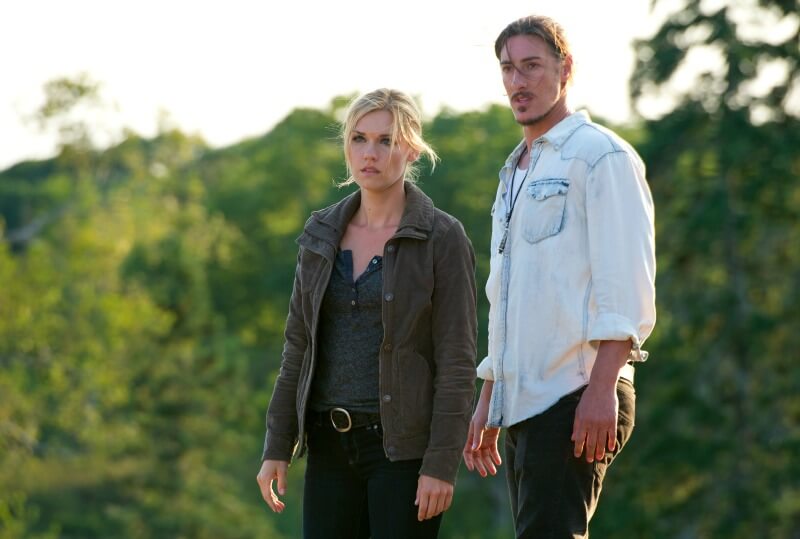
Suddenly, Duke had some really conflicted choices to make. Personal. Painful. The ‘do something bad to achieve something good’ kind of choices.
That weren’t contrived at all. And it wasn’t just a onetime choice – it became embedded in his character so kept coming up in new ways episode after episode. The other characters all had different reactions to Duke that fed storylines. He made different choices in different situations. It was brilliant.
Which is to say – you never know where it’s going to lead or what’s going to be possible when you give your characters a choice and make them live with the consequences. Within themselves and in relationships with other people.
Interesting choices make interesting stories.
R E S P E C T
I have never seen any show handle respect as well as Haven. Don’t get me wrong, I’ve seen a lot of shows handle it well. But Haven is so overt, so honest about when the characters do (and don’t) respect each other’s choices, especially when one character’s choice conflicts with what another character wants.
There are plenty of examples but there’s this one great, great moment that brought this lesson home to me. To avoid spoilers I’m not going to say when in the series and I’m going to be vague. But if you’ve watched the show you’ll know it.
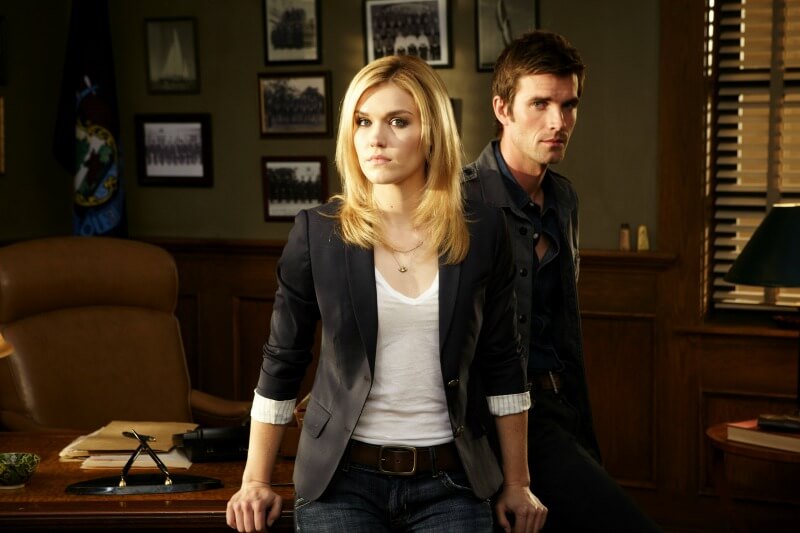
See, she has to make this choice. The whole episode is about her choice. And when she’s finally made it, he is trying to stop her. Desperate to stop her in one of those “I can’t let you go – we can fight this” ways. The kind we’ve all seen before and expect them to fight, expect that his desire for her will win the day for them both.
And then his best friend stops him. Won’t let him stop her. The friend says, “She is trying to help all these people. She is trying to help this town. And it is her choice. It’s not yours. It’s not mine. I hate it. But it’s still her choice.”
That moment right there absolutely blew me away because it was powerful and it was honest and respect at a level you don’t often see in stories. It’s storytelling gold. It’s conflicted. And it hurts and it’s honest and the friend shows more value for her in respecting her choice than he shows by fighting for her.
That was the moment I decided Duke was actually my favorite. And up until then, he’d been middle of the list.
There are no words for how awesome it is to watch characters make choices, and live with the consequences of not only their own choices but each other’s.
Practical Metaphors
Oh, Haven. The setup is ripe for metaphor and they fully utilize it, especially in later seasons. The episodes become almost a therapy session. But it’s buried so deeply in the physical and supernatural metaphor it doesn’t feel (too) obvious or mechanical.
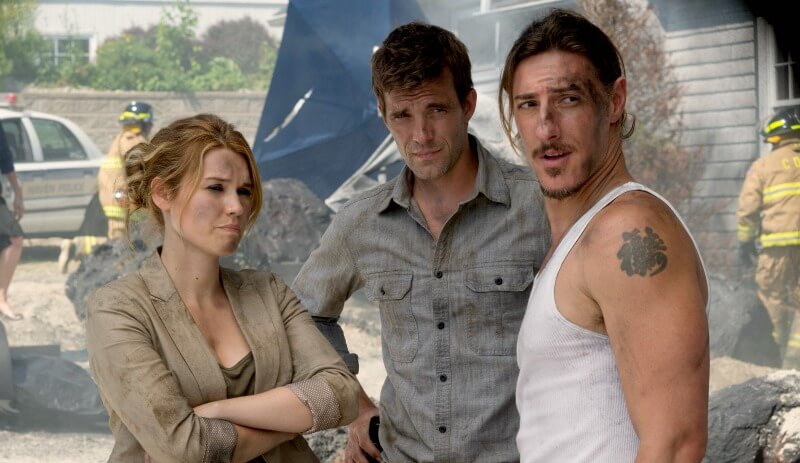
Want to teach a male character it’s ok to cry? Give him a powerful and painful reason to want his son to cry.
Want to talk about the need to face realities that you don’t want to accept in order to move on? Make their guilt hurt someone else they love.
It’s a fabulous study in taking the emotional journeys of the human psyche and making them tangible, visual realities.
Maybe you’re not writing supernatural or fantasy stories and so this lesson isn’t much help to you. But maybe it’s an interesting exercise even in a contemporary story. What would their guilt or fear or anguish look like? How would it manifest in the real world? Now, how does that change how you write it?
Make Even the Grandest Conflict Personal
Haven starts out with a bit of a mystery. They know the Troubles exist. They basically know the rules of how the Troubles operate. They’re not sure how Audrey Parker fits into the scheme of things. And there’s a lot they are aware that they don’t know about the Troubles. With that, they do two things really well:
- Balance each episode with a story of how the Troubles impact a specific character (or set of characters). Yes, there’s the bigger mythology and mystery surrounding the whole thing. But each episode is still focused on the impact in a very small frame, a very personal frame of one character. Two characters. One small story in the larger story.
- Make even the largest, oldest part of the story personal. Without giving too much away, everything in this story is about relationships, it’s about family. The supernatural aspect of the Troubles becomes simply mechanics in what is actually a small, personal story with larger repercussions.
I think sometimes stories get so big – the end of the world – the destruction of the galaxy – the end of life as we know it. Like the stakes have to be monumental or they don’t have enough of a threat or enough of an impact. I find it really interesting when a big story matters to the characters in a much more intimate way. The consequences are still big, but the conflict is personal in a small way (and also a little bit of a ridiculous way but casting William Shatner will do that).
The Necessity of Dimensional Characters
You know which character I despise in Haven?
Jordan.
On the surface she seems like an interesting counterpoint to Audrey. Except she is so afraid and violent and so desperate to be in control of everyone and everything around her.
And the problem isn’t really that she’s desperate.
It’s that she’s desperate ALL the time and never anything else.
The writers use her desperation and fear and penchant for violence to create conflict. Which might be ok except that’s all she ever does. Scream at people and make trouble and insist they choose what she wants.
It gets old because it’s abrasive to the audience. If she made trouble through different emotions and rational and showed dimension as a character it would probably have worked out fine.
So, when you use a contrary character, let them have layers. Dimensions. Nuances in their relationships.
Let them be more than one note.
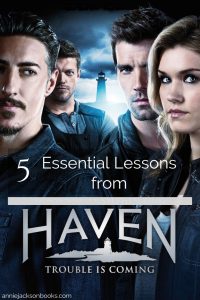
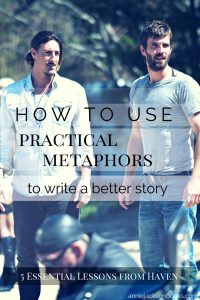
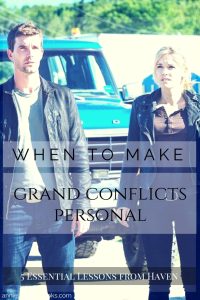
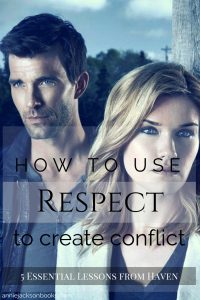
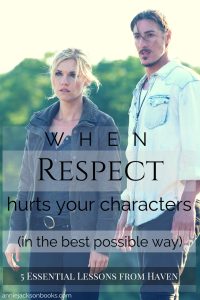
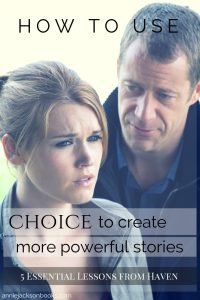
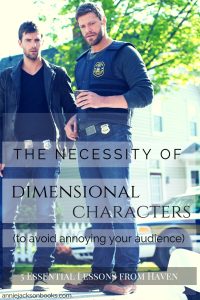
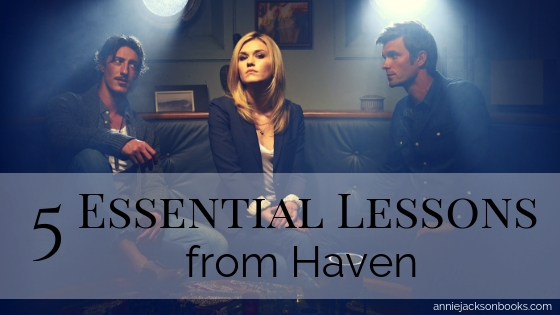
Thank you for this post! I clicked on it because I absolutely loved Haven (and also feel like no one has seen it) and wanted to see where you went with it. Respect and choice are major themes on my work in progress and I love what you said about them here. I may have even been a bit inspired to find a way to make my big disaster plot a more “personal story with larger repercussions.”
I am so glad to find another person who loved Haven! And that’s so cool that respect and choice are a major part of your work in progress. I have to confess as much as I can identify how important they are, I have a hard time weaving them into my stories. But I have a hard time with plot in general, so it’s what I’m working the most to improve. Talking about it with other writers helps so much! And I’m elated that you’re inspired to make your disaster plot more personal. I’d love to hear/read how that works out!
Haven should be studied the same way they made us study The Witness in film study class. Although, the last season just felt like it was dragging on too long! I love how you single out Duke as an example of character growth – he showed it more than any other character in my opinion. Audrey made me feel that she just suffered through the consequences of her and others’ actions at times. Thanks for the informative post and excellent points made! I’m going to binge watch it again, notebook in hand!
The last season did feel like it dragged some! And thank you/I agree – Duke quite unexpectedly became the most interesting character in the whole series. Enjoy your rematch!!!
It’s nice to know there are other people out there who watched Haven. I too did not care for Eric Balfour for the reasons you stated but grew to like him. Thanks for pointing out respect. I have never before read about this in any writing how-to’s. Good article. Thanks.
Thank you!! I’m so glad you not only enjoyed the article but I found someone else who watched and enjoyed Haven 🙂
Ok… so – after reading your article I thought I’d check out Haven. I couldn’t stop watching it and think I want to rewatch some of it. Sounds like you and I had the same reactions to the characters too. I want to learn how to write characters who feel as real as these – the dialogue is great!
That is so cool that you watched Haven from this post and even more that you liked it!!! The best way to learn to write characters who feel real is to practice… and watch lots of good tv 😉
I found this while watching haven for the first time and had a bit of a freak out. Awesome article!
Thanks! So glad you enjoyed it 🙂
I’m a long time fan of Haven. This gave me even more reason to like it. I want to rewatch episodes now.